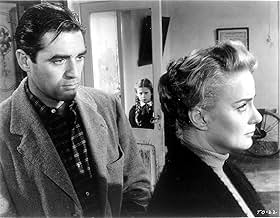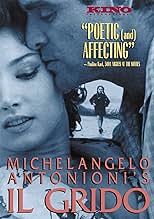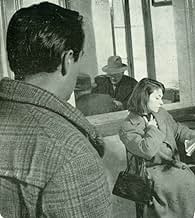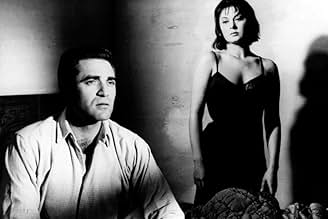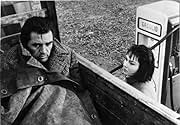IMDb-BEWERTUNG
7,6/10
5791
IHRE BEWERTUNG
Vereinsamt wandert ein Mann ziellos umher: Weg von seiner Stadt, weg von der Frau, die er liebte.Vereinsamt wandert ein Mann ziellos umher: Weg von seiner Stadt, weg von der Frau, die er liebte.Vereinsamt wandert ein Mann ziellos umher: Weg von seiner Stadt, weg von der Frau, die er liebte.
- Auszeichnungen
- 3 Gewinne & 2 Nominierungen insgesamt
Gabriella Pallotta
- Edera, her sister
- (as Gabriella Pallotti)
Jacqueline Jones
- Andreina
- (as Lyn Shaw)
Pietro Corvelatti
- Fisherman
- (Nicht genannt)
Elli Parvo
- Donna Matilda
- (Nicht genannt)
Empfohlene Bewertungen
Aldo's way takes him through the northern Italian region he knew in his youth. Gianni di Venanzo's photography is superb, capturing the bleak atmosphere of small towns: houses run down, cheap gas stations, a school in the middle of nowhere. There is nobody like Antonioni for portraying empty spaces leading nowhere.
Aldo is as confused a character as one can find in European cinema. His life with Irma is over-she doesn't love him anymore-but he insists on moving on with his daughter. Elvia and her sex pot sister Edera offer no shelter to this man, who can't afford to bring up a child. He gets lucky, it seems with Virginia and her crazy dad at the gas station, but still he manages to alienate her. The last stop is a rundown shack with a prostitute. The four actresses--Alida Valli, Betsy Blair, Dorian Grey and Lyn Shaw--all play well. Steve Cochran at least has the advantage of a sturdy build even if his acting skills are limited.
If Il grido is not as fine as L'avventura or Le amiche from the early period, it is still very good work.
Aldo is as confused a character as one can find in European cinema. His life with Irma is over-she doesn't love him anymore-but he insists on moving on with his daughter. Elvia and her sex pot sister Edera offer no shelter to this man, who can't afford to bring up a child. He gets lucky, it seems with Virginia and her crazy dad at the gas station, but still he manages to alienate her. The last stop is a rundown shack with a prostitute. The four actresses--Alida Valli, Betsy Blair, Dorian Grey and Lyn Shaw--all play well. Steve Cochran at least has the advantage of a sturdy build even if his acting skills are limited.
If Il grido is not as fine as L'avventura or Le amiche from the early period, it is still very good work.
For those who've been attending the Retrospective religiously, one of the best bits during the screening is the introduction to each movie as presented by Lorenzo Codelli, where he shares some little known facts of the movie with the audience. Today we were told that Monica Vitti actually was featured in Il Grido, not in person though but providing the dubbed voice behind Dorian Gray's character Virginia. So their collaboration stretched further back, even before L'Avventura.
The story centers on a working class sugar refinery worker Aldo (American actor Steve Cochran) who we learn has waited for 7 years cohabiting with Irma (Alida Valli), whose husband had recently passed away while in Australia. Thinking that this is a blessing in disguise in that he can finally marry Irma, Aldo gets the biggest surprise when he learns that the love of his life had in the last 4 months, given her heart to someone else. In rage he dished out unforgivable physical violence in public on her, and with a broken heart, picks up his daughter Rosina (Mima Girardi) to embark on an aimless road trip, wandering all over Po valley (which was the subject of one of Antonioni's early documentary).
Shot in the great outdoors, there's always a lingering mist in the first half of the movie, as if to accentuate Aldo's state of uncertainty and blur in his current state of life, without a clue what lies ahead as he drifts from location to location, and from person to person, as if like a person on a rebound, latching onto every opportunity that present itself to him, but all this while having absolutely no plans and unsure of what to do. While he seeks out his first love Elvia (Betsy Blair) and there comes this speed boat race, I thought Il Grido really picks up when he wanders toward a highway petrol kiosk, and meets with Virginia (Dorian Gray) and her alcoholic aged father (played by Guerrino Campanini).
Romancing the lady boss for food and lodging, having his daughter at his side demonstrated in truth that his relationship with and welfare for his daughter takes precedence over everything else, so while on the surface he might seem aimless, deep down he still bears a sense of responsibility to provide for Rosina, which probably gave him an invisible guiding hand in what he was doing, until of course he clinically evaluated and decided otherwise.
As he goes from woman to woman, having short temporal relationships with everyone we see on screen from Elvia to Andreina (Lynn Shaw), each played out like small skits, but a common thread running through it is that the characters here seem to be people who have wasted away their prime, missed the boat and are holding out for one last possibility at true love and happiness. Irma found hers although at Aldo's expense, and everyone else demonstrated memories with loved ones whom they cannot forget. The ending is nothing less than heart- wrenching, a discovery and affirmation of sad truths when people indeed have moved on, but then you realize that insofar you're still stuck in a rut. Very depressing if you ponder over it.
The last act also dwelt on impending change, with landscape changes ordered from the top, with common people on the ground being forced to accept these changes, with little regard to their livelihood. I thought it provided a poignant moment to reflect upon such frenzy, and sometimes the insensitivity that comes together with forced policies probably, and hopefully for the greater good.
The story centers on a working class sugar refinery worker Aldo (American actor Steve Cochran) who we learn has waited for 7 years cohabiting with Irma (Alida Valli), whose husband had recently passed away while in Australia. Thinking that this is a blessing in disguise in that he can finally marry Irma, Aldo gets the biggest surprise when he learns that the love of his life had in the last 4 months, given her heart to someone else. In rage he dished out unforgivable physical violence in public on her, and with a broken heart, picks up his daughter Rosina (Mima Girardi) to embark on an aimless road trip, wandering all over Po valley (which was the subject of one of Antonioni's early documentary).
Shot in the great outdoors, there's always a lingering mist in the first half of the movie, as if to accentuate Aldo's state of uncertainty and blur in his current state of life, without a clue what lies ahead as he drifts from location to location, and from person to person, as if like a person on a rebound, latching onto every opportunity that present itself to him, but all this while having absolutely no plans and unsure of what to do. While he seeks out his first love Elvia (Betsy Blair) and there comes this speed boat race, I thought Il Grido really picks up when he wanders toward a highway petrol kiosk, and meets with Virginia (Dorian Gray) and her alcoholic aged father (played by Guerrino Campanini).
Romancing the lady boss for food and lodging, having his daughter at his side demonstrated in truth that his relationship with and welfare for his daughter takes precedence over everything else, so while on the surface he might seem aimless, deep down he still bears a sense of responsibility to provide for Rosina, which probably gave him an invisible guiding hand in what he was doing, until of course he clinically evaluated and decided otherwise.
As he goes from woman to woman, having short temporal relationships with everyone we see on screen from Elvia to Andreina (Lynn Shaw), each played out like small skits, but a common thread running through it is that the characters here seem to be people who have wasted away their prime, missed the boat and are holding out for one last possibility at true love and happiness. Irma found hers although at Aldo's expense, and everyone else demonstrated memories with loved ones whom they cannot forget. The ending is nothing less than heart- wrenching, a discovery and affirmation of sad truths when people indeed have moved on, but then you realize that insofar you're still stuck in a rut. Very depressing if you ponder over it.
The last act also dwelt on impending change, with landscape changes ordered from the top, with common people on the ground being forced to accept these changes, with little regard to their livelihood. I thought it provided a poignant moment to reflect upon such frenzy, and sometimes the insensitivity that comes together with forced policies probably, and hopefully for the greater good.
In the total of Antonioni's films, 'Il grido' (= Italian for 'the outcry') makes an exception: it is entirely set in a worker's environment. Usually Antonioni's actors and actresses perform people who don't earn their living by physical labor.
Produced shortly before Antonioni's famous trio 'La Notte', 'L'eclisse' and 'L'avventura', this film from 1957 clearly shows the theme Antonioni got so famous with: men losing their roots, being dislocated & disoriented by the advancement of technology. Around 1960 this pessimism was very current.
On top of this, 'Il grido' carries every other Antonioni-feature. Fine shooting, while emphasizing on geometries in buildings and landscapes (Antonioni was educated as an architect). First class actors and actresses who seldom laugh and make joy. And, as I already mentioned, a pessimistic theme linked with some grand-scale technical advancement.
Antonioni is renowned as 'the poet of misery'; 'Il grido' is quite in line with this statement.
Produced shortly before Antonioni's famous trio 'La Notte', 'L'eclisse' and 'L'avventura', this film from 1957 clearly shows the theme Antonioni got so famous with: men losing their roots, being dislocated & disoriented by the advancement of technology. Around 1960 this pessimism was very current.
On top of this, 'Il grido' carries every other Antonioni-feature. Fine shooting, while emphasizing on geometries in buildings and landscapes (Antonioni was educated as an architect). First class actors and actresses who seldom laugh and make joy. And, as I already mentioned, a pessimistic theme linked with some grand-scale technical advancement.
Antonioni is renowned as 'the poet of misery'; 'Il grido' is quite in line with this statement.
Other reviews to the contrary, if you found Le Notte or L'Eclisse lacked sufficient plot, I doubt you'll enjoy Il Grido. However, unlike later Antonioni, the focus here is not on fear of commitment & loss of passion, but on a classic spurned lover. Like L'Eclisse, Il Grido begins with breakup, magnificently acted & powerfully filmed; we feel each shudder of pain. In fact, both films' power rests on us sharing this experience, second by second, nerve-end by nerve-end. Note Irma's efforts to hold to the fabric of order & routine to keep a lid on Aldo's fury & the careful portrayal of Aldo's frustrations.
Il Grido's opening builds to a very public & final breakup. It initiates Aldo's journey away from Irma & home. I kept thinking of Schubert's song cycle, Winterreise. In both, after rejection the protagonist's world ceases to hold together. Only here the descent isn't into winter but into fog, industrial sprawl, & ever more spartan existence. Even the piano which accompanies Aldo reminded me of lieder.
The opening's not quite picturesque scenery may suggest nurturing home values. Unlike couples in other Antonioni classics, Aldo & Irma have a daughter, & to Aldo their lives seemed fulfilled. The almost picturesque is soon replaced by encroaching industrial sounds & images. Several times we see trees felled as an old order is being swept away. At film's end, the whole town is slated for demolition, & we are asked to contemplate the relation between the Winterreise-like main text of lost love & this subtext of industrial sprawl & oppressive, intrusive government. No clear connection is given, but as in later Antonioni, the images work their effect as much on our subconscious as on our intellect; whether we can verbalize our thoughts or not, we feel this rupture with earlier values & social structures. For me, Il Grido is a more honest film than L'Avventura. If it lacks a bit of the elegant, refined photo compositions of Antonioni's trilogy, it rests on the same detailed, carefully structured cinematography.
Il Grido's opening builds to a very public & final breakup. It initiates Aldo's journey away from Irma & home. I kept thinking of Schubert's song cycle, Winterreise. In both, after rejection the protagonist's world ceases to hold together. Only here the descent isn't into winter but into fog, industrial sprawl, & ever more spartan existence. Even the piano which accompanies Aldo reminded me of lieder.
The opening's not quite picturesque scenery may suggest nurturing home values. Unlike couples in other Antonioni classics, Aldo & Irma have a daughter, & to Aldo their lives seemed fulfilled. The almost picturesque is soon replaced by encroaching industrial sounds & images. Several times we see trees felled as an old order is being swept away. At film's end, the whole town is slated for demolition, & we are asked to contemplate the relation between the Winterreise-like main text of lost love & this subtext of industrial sprawl & oppressive, intrusive government. No clear connection is given, but as in later Antonioni, the images work their effect as much on our subconscious as on our intellect; whether we can verbalize our thoughts or not, we feel this rupture with earlier values & social structures. For me, Il Grido is a more honest film than L'Avventura. If it lacks a bit of the elegant, refined photo compositions of Antonioni's trilogy, it rests on the same detailed, carefully structured cinematography.
Some folks watching "Il Grido" might be surprised to see some Americans in this Italian film. In the 1950s and 60s, quite a few Italian directors (such as Antonioni and Fellini) cast Americans and had them dubbed into Italian. Most were second and third tier actors at the time (such as Steve Cochran, Richard Basehart and Anthony Quinn) but later even some big name stars performed in the Italian films (such as Burt Lancaster). I think the reason they did this was to attempt to increase the marketability of the movies outside of Italy--and these stars would help.
The film begins with Irma (Alida Valli) learning that her husband is dead. He apparently has been gone for many years and the interim she's been living with Aldo (Steve Cochran). They even have a child together. Here's the odd part, however, now that she knows she's a widow, she tells Aldo to leave! He is not at all happy and eventually he disappears along with his daughter. For the rest of the film, Aldo and his daughter move from town to town. However, Aldo has difficulty connecting with other women and he rejects opportunity after opportunity for relationships. Instead, he remains socially isolated and depressed.
Overall, you'll probably find this film a bit slow and depressing. While this is usually a big turn-off, it actually works here. Director Antonioni wants to create a depressing portrait of a lost man and does it quite well. The simple piano score sure helps with this. Not a film for everyone but exceptionally well made.
By the way, at one point in the film, you see folks saying they caught a couple porcupines and were going to eat them. These actually were hedgehogs--you never would hold porcupines the way they did nor do I think you'd eat them! This is simply a mistranslation.
The film begins with Irma (Alida Valli) learning that her husband is dead. He apparently has been gone for many years and the interim she's been living with Aldo (Steve Cochran). They even have a child together. Here's the odd part, however, now that she knows she's a widow, she tells Aldo to leave! He is not at all happy and eventually he disappears along with his daughter. For the rest of the film, Aldo and his daughter move from town to town. However, Aldo has difficulty connecting with other women and he rejects opportunity after opportunity for relationships. Instead, he remains socially isolated and depressed.
Overall, you'll probably find this film a bit slow and depressing. While this is usually a big turn-off, it actually works here. Director Antonioni wants to create a depressing portrait of a lost man and does it quite well. The simple piano score sure helps with this. Not a film for everyone but exceptionally well made.
By the way, at one point in the film, you see folks saying they caught a couple porcupines and were going to eat them. These actually were hedgehogs--you never would hold porcupines the way they did nor do I think you'd eat them! This is simply a mistranslation.
Wusstest du schon
- WissenswertesMichelangelo Antonioni's first collaboration with his future muse and lover, Monica Vitti. Although Vitti doesn't physically appear in the film, she dubbed the Italian lines for Dorian Gray.
- PatzerAlle Einträge enthalten Spoiler
- VerbindungenFeatured in Cinema Paradiso (1988)
Top-Auswahl
Melde dich zum Bewerten an und greife auf die Watchlist für personalisierte Empfehlungen zu.
- How long is Il Grido?Powered by Alexa
Details
Box Office
- Bruttoertrag in den USA und Kanada
- 16.549 $
- Eröffnungswochenende in den USA und in Kanada
- 6.536 $
- 10. Nov. 2024
- Weltweiter Bruttoertrag
- 17.413 $
- Laufzeit
- 1 Std. 56 Min.(116 min)
- Farbe
Zu dieser Seite beitragen
Bearbeitung vorschlagen oder fehlenden Inhalt hinzufügen


